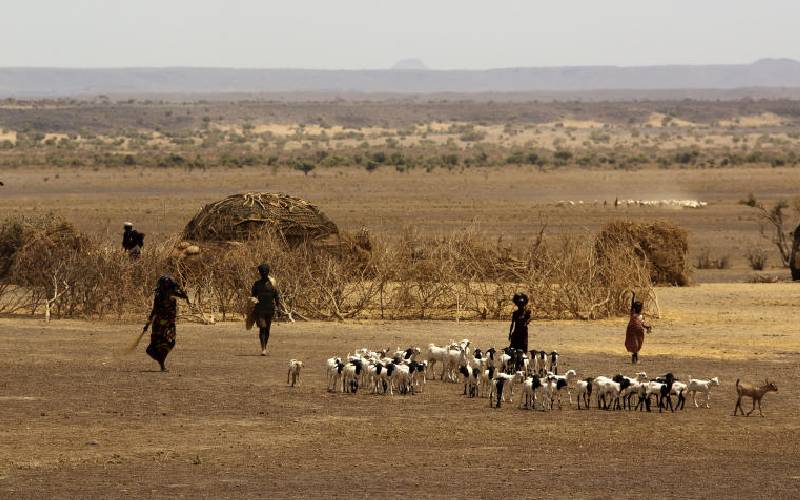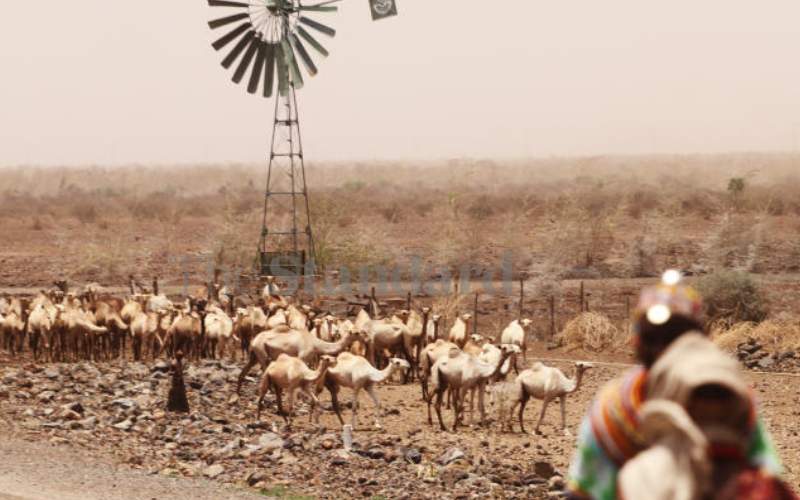
Gabbra pastoralists, North Horr, August 2005. [Courtesy]
Some herders in pastoral communities are no longer moving from one place to another in search of water and pasture for their livestock.
Most who lived nomadic lifestyles also hardly built permanent homes, but for some, that is becoming a thing of the past in the wake of the devastating effects of climate change.
Inkinye village in Kajiado Central, for instance, has permanent houses including schools, hospitals and other amenities but one thing a visitor notices is that large herds of cattle are missing.
Agnes Leina, one of the residents says with permanent homes and children in school, moving around has been minimized.
“This place is now dry and we have moved our cattle to the place we hear has some grass and we have to pay to get feed and water.”
Leina says even though pastoralists are now educated, they cannot discard their traditions. Most have been mixing nomadism and technology that includes using mobile telephony in tracking employed herders and paying for water and hay until pasture resumes.
Other pastoralists with vehicles track their cattle for sickness besides monitoring births and ferrying calves to the vet or the next destination as opposed to earlier cases in which “they would be carried by the herders and would slow their pace,” explains Leina, also a director of Illaramatak Community Concerns, which has been training women to adapt to climate change especially after the supply of milk reduced in the homesteads.
“Now that the cows have been taken away from the homes, they have to find alternative ways of survival.”

Camels at a watering hole in Northern Kenya, February 2021. [Elvis Ogina, Standard]
They have turned to non-climate-dependent activities such as beadwork and weaving mats.
Lilian Namunyak Lenina, a young woman buys her beads from Nairobi for making beaded shawls, bracelets and necklaces and says “I can get enough money to pay for school fees, food and I can save for future use.”
Her bracelets cost Sh200 and necklaces Sh1, 500 and for now “we don’t rely on our cattle…it is something we can do as we wait for the weather to change.”
Young and old women especially former circumcisers are also engaged in beadwork and are now ex-FGM crusaders.
Margaret Terai, an ex-cutter, earned Sh1000 for each girl she cut, but now is making and selling beaded items.
“I have managed to take boys to school and now I have built myself a good house after abandoning the knife,” says Terai.
According to Eve Merin, The Kajiado County Gender and Social Services Director, this is a deliberate move by the county government to empower women to venture into business as a way of cushioning them from climate change.
This article is part of AWiM/UNEP African Environmental Journalism Programme
 The Standard Group Plc is a multi-media organization with investments in media
platforms spanning newspaper print
operations, television, radio broadcasting, digital and online services. The
Standard Group is recognized as a
leading multi-media house in Kenya with a key influence in matters of national
and international interest.
The Standard Group Plc is a multi-media organization with investments in media
platforms spanning newspaper print
operations, television, radio broadcasting, digital and online services. The
Standard Group is recognized as a
leading multi-media house in Kenya with a key influence in matters of national
and international interest.











